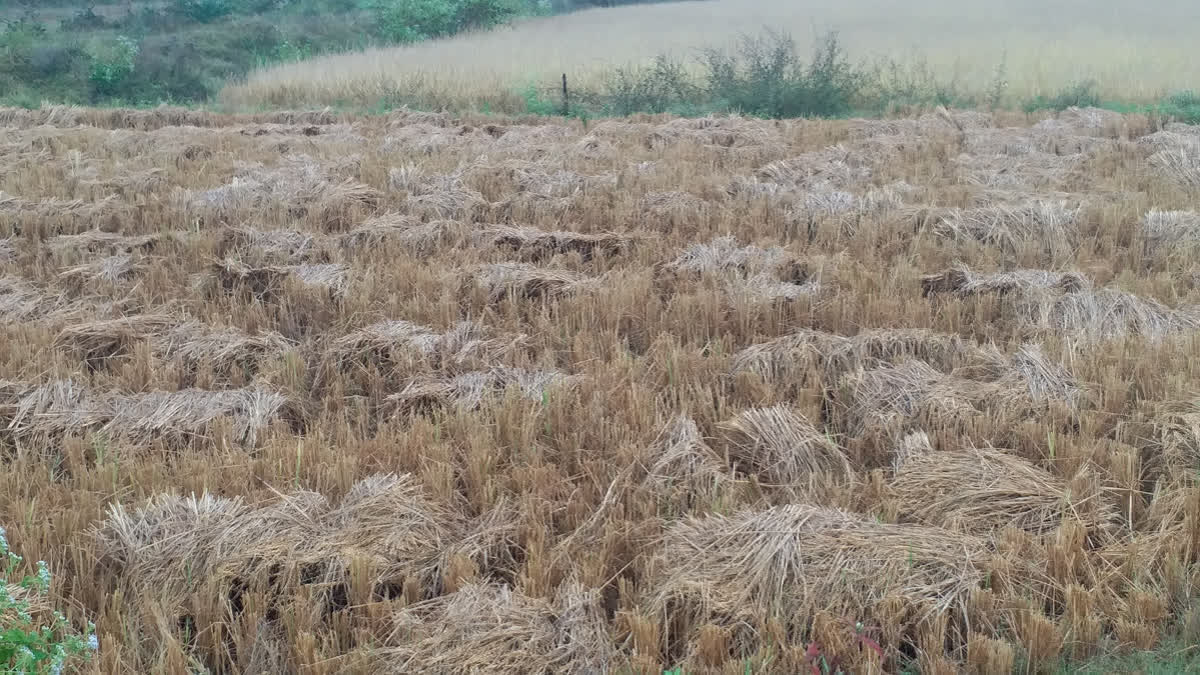New Delhi: Amid concerns over crop loss due to unseasonal rainfall, agriculture experts have suggested that the Union government should focus on increasing the number of Gramin Krishi Mausam Sewa (GKMS) systems to provide benefits to the farmers at ground level.
Highlighting the farmers' issues, expert Dharmendra Malik told ETV Bharat, "Farmers are not getting actual benefits of GKMS at ground level due to limited number of the system to provide biweekly weather updates."
“The government should focus on setting up GKMS to provide real-time data on weather so that farmers can easily plan their cultivation and get more produce from farmland. The authorities establish GKMS at block and panchayat levels so that information can be accessed easily," Malik said.
Another expert Rakesh Kumar asserted, "Agrometeorological helps farmers a lot but these are very less in numbers across the country. As a result, the farmers are deprived of its actual benefits. Automatic weather forecast systems provide above 85-95 percent accurate data. If the tower system is set up within a 10 km radius, the accuracy increases up to 98-100 percent."
Several experts have stressed for establishing more GKMS zones to facilitate ground-level farmers, citing that its real-time data will also help during Farm Insurance assessment. They said in over 700 districts across the country, only 130 Agromet Field Units (AMFUs) covering 127 agroclimatic zones at various State Agriculture Universities (SAUs), Indian Council of Agricultural Research (ICAR), and Indian Institute of Technology (IITs), are currently operational. IMD provides medium-range weather forecasts for rainfall, temperature, relative humidity, cloud cover, wind speed, and direction at district and block levels for the next five days, along with subsequent week rainfall and temperature outlook at the meteorological sub-division level.
Meanwhile, Minister of State for Agriculture and Farmers Welfare, Ramnath Thakur informed Lok Sabha, "Based on observed weather and the forecast, AMFUs prepare biweekly Agromet Advisories (every Tuesday and Friday) for their respective districts to help the farming community make necessary decision about selection of appropriate crop and varieties (including tolerant/resistant varieties), choosing windows for various intercultural operations like sowing, harvesting, weeding, threshing, irrigation scheduling, and fertiliser application."
"Impact-Based Forecast (IBF) for agriculture, along with associated Agrometeorological advisories is also issued by AMFUs during severe weather warnings such as heavy rainfall, hailstorms, heat waves, cold waves, and strong surface winds for different districts of various States and UTs across the country based on forecasts and warnings issued by National Weather Forecasting Centre, New Delhi. Agromet Advisories are disseminated through a multichannel dissemination system, including SMS via Kisan Portal and Public-Private Partnership (PPP) initiatives. SMS-based alerts and warnings along with suitable remedial measures, are being sent during extreme weather events like cyclone, deep depression through Kisan Portal," Thakur added.
Technological advancements have further enhanced accessibility, enabling farmers to receive location-specific forecasts through mobile apps such as Meghdoot and Mausam. Additionally, IMD has integrated its services with IT platforms of 16 state governments, allowing farmers to access information in both English and regional languages, the ministry informed.
Speaking on the issue, a farmer from Uttar Pradesh Amar Pal said to ETV Bharat, "We get some weather-related information from India Meteorological Department but at times it gives us weather data of other states. In that case, all information goes waste. We need accurate data for better crop management."
Read More
Assessment Of Crop Losses Through Satellite Remote Sensing: Union Minister Ramnath Thakur



